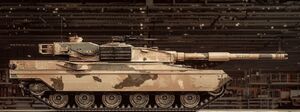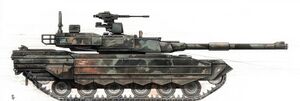Caracal Main Battle Tank
| Caracal Main Battle Tank | |
|---|---|
 The Caracal in its original production configuration | |
| Place of origin | Willink |
| Service history | |
| In service | 1996 to present |
| Used by | Willink |
| Production history | |
| Produced | 1996-present |
| No. built | in excess of 300,000 |
| Specifications | |
| Weight | ~60 Tons |
| Length | 7.6 m |
| Width | 3.6 m |
| Height | 2.5 m |
| Crew | 3 |
| Armor | Modular composite/ERA/blowoff panels |
Main armament | 125mm Bodosakis-B125C smoothbore |
Secondary armament | 7.62mm MG, .50 cal HMG |
| Engine | Phoebus 1500 turbocharged diesel 1,500 hp |
| Transmission | Hydromechanical, 6-speed automatic system |
Operational range | 550 km on-road, 400 km off-road |
| Speed | 65 km/h on-road, 45 km/h off-road |
The Bodosakis Caracal is a Willinkian main battle tank, first entering service with land units in 1996. Designed following Willinkian experiences operating Doomani and Questarian tanks in the 1970s and 1980s, the Caracal developed out of the challenges facing Willinkian armored doctrine, with a desire to economize and localize production, and to harmonize speed and firepower with advanced sensors and repairability. The Caracel quickly became the primary Willinkian main battle tank in service, variously supplemented by units operating Doomani Mad.III E and Mad.IV tanks, as well as Macabéan Nakil 1A2 and 1A1 tanks. Beginning in 2023, many Caracals have begun upgrade processes to bring their status to Block 2 , which features numerous major upgrades to electronics, data management, battlefield networking, armor, and optic systems, bringing the platform solidly into the "next generation".
Background
The Carcarel MBT emerged as a response to the evolving armored warfare doctrines of the 1980s and 1990s. Influenced by both Doomani and Questarian tank designs (notably the Mad.III E) the Carcarel sought to carve out a unique niche as a fast, heavily armed, and competently armored main battle tank optimized for Willink's varied operational environments. Bodosakis sought to prioritize flexibility, ease of maintenance, firepower and optics, and effective maneuver warfare in approaching design principles. As most military forces in Willink consist of various militas, ability to mothball and perform quick operational adjustments or repairs were a must, as well as a concerted effort to force down cost per man hour of operation.
Design
Armament
Keeping with Willinkian experience with Doomani armor, the primary armament of the Caracal is its 125mm Bodosakis-B125C smoothbore main gun. This cannon features a chrome lined barrel to mitigate heat damage and wear, barrel length of 6.25 meters in an effort to enhance muzzle velocity, and relies on hydropneumatic recoil dampers to reduce stress on the turret and vehicle. The barrel itself is constructed out of nickel-chromium-molybdenum steel alloy in a bid to improve durability. The gun mounts a thermal shroud and a gas evacuation system to improve crew safety and reduce barrel fouling. The B-125C is capable of firing various types of ammunition, including APFSDS, HEAT-FS, HE-FRAG, and gun launched ATGMs (Bodosakis-P230). The P230 is a potent 125mm laser beam riding tandem HEAT anti-tank missile, effective at ranges up to 5 km and capable of ~1,200mm RHAe of armor penetration. The P230 is capable of dynamic evasive maneuvers, such as spiraling, to avoid interception by active protection systems. Designed to respond to heavier armored vehicles, the missile accelerates to ~1,000 m/s for terminal impact and penetration, amplifying the HEAT warhead's effects by increasing kinetic energy transfer.
The tank mounts a carousel-style autoloader beneath the turret floor, with 28 ready rounds stowed in the autoloader and additional storage for 15–20 rounds in an armored compartment mounted at the rear of the turret. The system uses a bustle-fed autoloader, reducing crew exposure to ammunition explosions. Ammunition is stored primarily in an armored compartment in the rear of the turret, separated from the crew by a blast-proof bulkhead. This compartment is further engineered with blowout panels.
